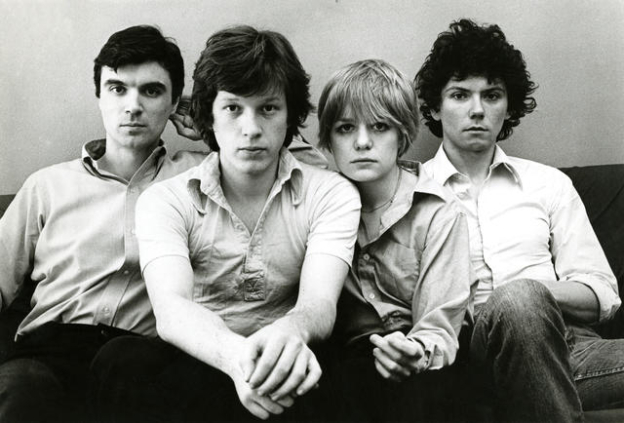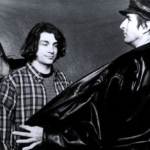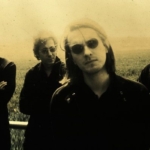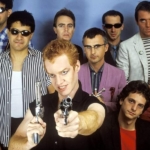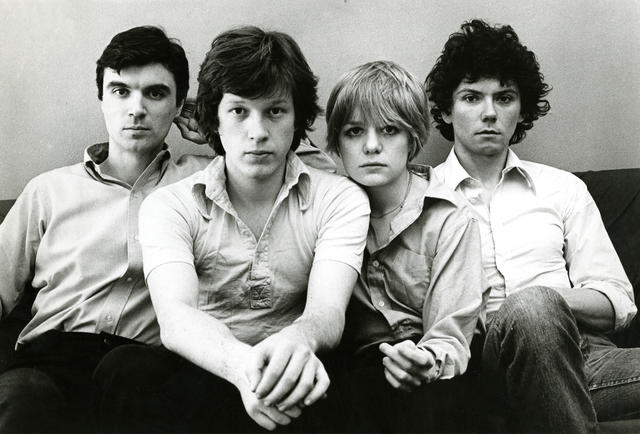
Talking Heads were four nerds who started off as three nerds in 1975, meeting each other at the Rhode Island School of Design. I’ll tell you what they designed. They designed one hell of a band! Haha har har harhar!!
David Byrne provides lead vocals, guitar, and (lack of) personality. Chris Frantz hit the drums and wrote a few songs. Tina Weymouth was “the girl”; she also picked up the bass and brought the funk. Jerry Harrison joined the band shortly after its inception to bring MORE guitar and occasional keyboards.
The band were light years ahead of their time until they fell into the worldbeat fad near the mid-’80s. The band fizzling out and splintering can be attributed to Byrne being a complete weird and belligerent control freak. You can hear and read all about it in the many interviews and books among the members. Even Byrne himself will admit to the bad blood. I unconditionally love the guy, but you couldn’t pay me any money to hang out with him even once!
The band disbanded in 1991, only to fully reunite one last time (under duress) for a few songs after their induction into the Rock and Roll Hall of Fame in 2002.
Talking Heads don’t have a website or anything! Here’s David Byrne’s Bandcamp Page.
JUMP TO:
(1977) Talking Heads: 77
(1978) More Songs About Buildings and Food
(1979) Fear of Music
(1980) Remain in Light
(1983) Speaking in Tongues
(1985) Little Creatures
(1986) True Stories
(1988) Naked
Talking Heads: 77 (1977) – Rating: 8/10
Click Here for the Full Album Review
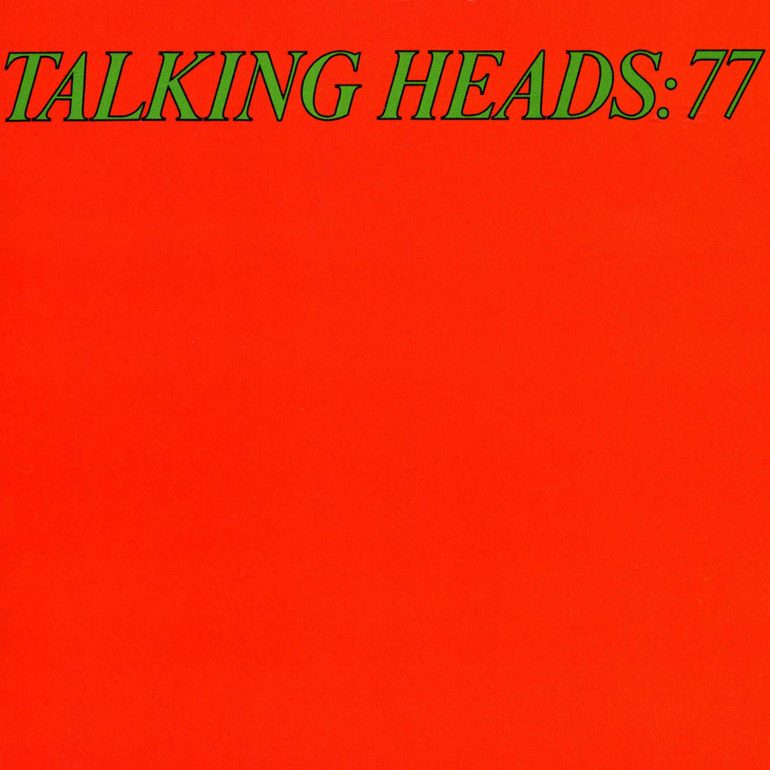
The album that shaped American punk. The album that, stylistically, seemed to come out of nowhere; in a year dominated by classic rock on its way out (or succumbing to ’80s artistic tastes for all the wrong reasons), in a year dominated my progressive rock becoming an over-inflated out-of-control self-parody (neo-prog, anyone?), in a year where English punk music surfaced as the antithesis to English prog rock (hello Sid Vicious), you had the Talking Heads’ debut Talking Heads: 77. Simple, unassuming. Almost in a vacuum. No obvious influences whatsoever. Funk? Dance? Pop? This is definitely not actual punk, that’s for sure.
I think the spirit of punk is what makes this wimpy, meek album a true blue punk album. Art punk. David Byrne’s already confident in his persona as the paranoid neurotic whose lyrics have no deeper meaning than what’s on the surface (“I pick the building that I want to live in/It’s over there, it’s over there“). This kind of ultra-literal, non-grandiose, non-metaphorical lyricism goes against everything that rock music had been up to this point. No love songs, no tough-guy machismo, no epics about fantastical subjects, no sad blues, no cheeky commentary, and no pop-happiness. It’s in a world of its own. It eschews conventions. It doesn’t get anymore punk than that.
The actual songs, of course, are fantastic. It takes a while to get into, and I certainly didn’t like it too much at first, but eventually these tunes become indispensable. Especially the latter half, making this a rare bottom-heavy record. There’s just the three of them playing — Jerry Harrison doesn’t show up until the next album — and the production is basically non-existent. Stripped down guitar/bass/drums setup with little to no flair. But it’s oozing with a weird charm. Byrne is oddly relatable as the hopeless introvert trying to turn this into a therapy session. “No Compassion” shows Byrne’s polite frustration at dealing with… well, people. “What are you, in love with your problems?/I think you take ita little too far/It’s not so cool to have so many problems/But don’t expect me to explain your indecisions“. What is this? Is this music? Yes. And it’s glorious.
Describing the individual songs is meaningless, because they’re all the same. The attitude is what’s important, and you can see glimmers of the future genius already. Once the music itself gets unnerving to match the lyrics, and once the sound is solidified once and for all as truly unique, that’s when it all comes together. For now, Talking Heads: 77 is brilliant in its simplicity. That shit is worth its weight in gold.
And, oh yeah, this is the album with “Psycho Killer” on it. You already know that song, and you already now how much they accomplished with so little.
More Songs About Buildings and Food (1978) – Rating: 6/10
Click Here for the Full Album Review
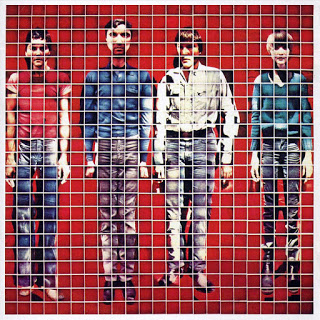
Yeah, I know. Giving a record like this a 6 would be considered blasphemous in most Talking Heads circles, but hear me out on this one, ok? Ready? Here we go… a lot of this record is kind of boring.
You heard me. Maybe the part of the problem is that I can FEEL the tediousness of taking and assembling 529 Polaroid shots of the band members standing there as I’m listening to songs like “Warning Sign” and “Stay Hungry”, but I’ve been listening to More Songs… for almost 20 years and there is just so much about it I don’t like. It’s jagged without atmosphere. It’s repetitive without the same Talking Heads: 77 charm. It’s internal diversity is incredibly weak. It doesn’t feel like any of this means anything. There are no peaks, there are no valleys. It feels like the flat, desolate highway of the Talking Heads discography.
Not at all Jerry Harrison’s fault. Adding him to the band was undeniably a step in the right direction, and the jangly interplay between he and Byrne that starts with this album helped shape the Heads’ trademark style. The repetitious jangly jangly jangliness was used sublimely on “Found a Job”, the jangliest Heads song you could ever damn well listen to. And it’s my personal highlight; I could get lost for days in that extended coda. Everything around it, though, I don’t know. “The Girls Want to Be with the Girls” is annoying, plain and simple (“And the boys say/WHAT DO YOU MEEEEEEAN?“), while songs like “Artists Only”, “I Am Not in Love”, “With Our Love”, “Stay Hungry”, they all are lacking in hooks and strong melodies. I’m surprised Brian Eno worked on this, because he’s a master of atmosphere and the atmosphere is non-existent.
OK, that’s enough of the bad stuff. “Thank You for Sending Me an Angel” does have atmosphere and a strong melody and meshes the angular guitars nicely with the non-angular keyboards. Plus, Byrne’s lines fit snuggly within the music in a manner I can’t say about most of these tracks, where it sounds more like Byrne is fighting to squeeze his lyrics in any empty space he can find. “The Good Thing” is a pretty song, and that endearing autism is definitely present on this one: “A straight line exists between me and the good things/I have found the line and its direction is known to me/Absolute trust keeps me going in the right direction/Any intrusion is met with a heart full of the good thing“. The Al Green cover “Take Me to the River” is the signature track, and it’s a very peaceful rendition if not a little bit long. Speaking of long, you can trim about two minutes off of “The Big Country”. It feels like it takes way to long to get to the best parts, the payoff, after all those romantic descriptions of farmlife, the minor chord chorus of “I wouldn’t live there if you paid me/I wouldn’t live like that, no siree“. They would tackle this subject of rural disdain ten years later on “(Nothing But) Flowers”, a song which is exactly as long and five times more interesting. BUT, if you be vibin’, you can do no better than “The Big Country”. It’s merely a slog of an album finisher is all I’m saying.
I can’t believe Brian Eno produced this. The mood is so stark and…absent. It’s a shame. It’s a good thing that the next two albums more than make up for this one, but I’m clearly in a camp of my own with my negative opinions about this record. After nearly two decades of listening to it, though, I’m fairly comfortable with my stance.
Fear of Music (1979) – Rating: 10/10
Click Here for the Full Album Review
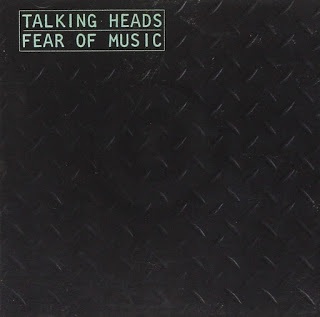
Now we’re talking! Fear of Music single-handedly makes up for all the atmosphere missing from More Buildings… and shells out eleven excellent tracks in a row! If you haven’t listened to this, then do yourself a favor. It’s a real treat.
As any reviewer who thinks he’s unique will tell you, the title isn’t referring to being afraid of music. It’s showcases a collection of “fear of” music! Fear of mind! Fear of paper! Fear of cities! Fear of life during wartime! Fear of air! Fear of heaven! Fear of animals! Fear of drugs! All these reviewers fail to mention that this template doesn’t work with the other three tracks, and it’s a shame, but 8 out of 11 ain’t bad. Fear of electric guitar? That’s not scary! We learned a long time ago that the devil doesn’t care too much about electrifying your guitar.
Add Brian Eno’s moody production to the fear angle and you’ve got a winner. From the cover to the apparent mental health of the vocalist, this stuff is dark. And yet… hold on… are those melodies I hear? Finally? After two albums of uniformity, for better and for worse, I have an album with a distinct musical thumbprint for every track? “I Zimbra” and its claustrophobic worldbeat rhythms? “Life During Wartime” and its bombastic new wave swing punk? “Heaven” and its ethereal and uneasy melancholy? “Animals” and its snarling, punchy aggression? I could go through each one. “Paper” and its moody jangle rock progressions? “Drugs” and its totally tripped-out murky lethargy? Should I do each one? “Memories Can’t Wait” and its hellish, gothic despair? Don’t stop me now! “Mind” and its almost mocking guitar lines? Oh god, he’s going all the way, isn’t he? “Cities” and its razor saw guitar solo? “Air” and its harrowing ghostly synthesizers? “Electric Guitar” and the fucking tuba? And it all manages to be memorable, oh my god.
And it’s all so well put-together. It’s clever and self-aware, with not a single overly ridiculous song where the fear is campy. The fear is all in the head, man, and that’s the worst fear of them all. “Heaven” is the best song I’ve ever heard about an afterlife. The gentle guitar slowly becomes slightly distorted, as if addled by mood-stabilizers, while David Byrne gets riled up (but not too much) about Heaven being “a place where nothing ever happens”. He never outright highlights the concept of eternity, but he goddamn sure gets you thinking about it! Or how about “Cities”, where Byrne doesn’t entirely sell himself on the idea of moving to a city. You can hear the apprehension when he talks about “getting some thinking done” at the dry ice factory, as if there’s got to be SOMETHING to look forward to. And then “Drugs”, which interrupts a trip with invasive thoughts about bill collecting. Every song has these quirks that adds to the experience that Fear of Music provides to the listener. Like the lyrics are coming from a man on the brink of insanity, but just far enough from insanity for one to empathize with. It’s genius.
Instant classic. Find me a better album from 1979 and I won’t make you listen to Smashing Pumpkin’s “1979”, which is also quite moody.
Remain in Light (1980) – Rating: 10/10
Click Here for the Full Album Review
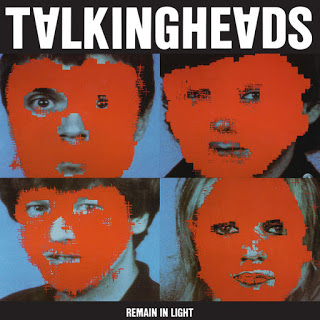
Remain in Light dropped on October 8, 1980. The ‘80s had barely started and the album was already a major contender for the best of the decade. Nay, one of the best albums of all time, at least in the post-classic rock era. It’s the ultimate convergence of all the good facets of Talking Heads on one album, perfecting the atmosphere from Fear of Music and avoiding the accidentally sort-of-dull aspects of the worldbeat they would play around with on Speaking in Tongues and beyond. Plus, this is the one with “Once in a Lifetime” on it; the song with that music video. Byrne at his peak Byrnian.
The album’s first three songs are perhaps the best three-song run in the history of rock music. A back-to-back-to-back sprawling urban paranoia that’s as painfully blue, black, and red as the cover art. “Born Under Punches (The Heat Goes On)” cryptically references an oppressive government, with vocals suffocating under an oppressive beat. The rhythms are repetitive and and in constant motion. “All I want…is to breathe…”. Brian Eno provides the bridge with a mess of bubbly electronic effects, almost to mock the narrator. “Crosseyed and Painless” slows down (barely) with the funkiest groove you’ll find on this end of the neuroticism spectrum. I think Byrne here is discussing the concept of “the more we learn, the more we realize we do not know”, pointing out the irony of facts ruining everything for the fact-finder. The music is sublime as shit, man. I love the falsetto chorus. “There was a liiiiiiine/There was a formula/Sharp as a kniiiiiiife/Facts cut a hole in us”. Certainly, the best for last, is “The Great Curve”, a contender for MY personal favorite song ever written. The jangly, perpeptual call-and-response phrases, the angular Belew guitar solos that are designed to dance nimbly around those call-and-response phrases, the perfectly layered vocal harmonies, the many melodies, the unrelenting energy; this shit COOKS. It’s the perfect song. Listen to it and be converted.
The rest of the album is a bit of a cool-down after the first high-intensity 15 minutes. You already know about “Once in a Lifetime”, it warrants no further comment. “Houses in Motion” foreshadows the funky rhythms of Speaking in Tongues, while the underrated “Seen and Not Seen” offers some weirdo spoken word nonsense about consciously prearranging one’s own first impression over some pre-trip-hop psychedelic beats.
Then comes the real cool-down with the final two tracks. “Listening Wind” brings us through the swampy jungle. Gone now is all the urban agoraphobia — replaced with cautious uneasiness. Then “The Overload”, a droning, introspective recap. The apocalyse is over, and the endless dreary wasteland lies before you.
A classic. 500 words doesn’t do it nearly enough justice.
Speaking in Tongues (1983) – Rating: 6/10
Click Here for the Full Album Review
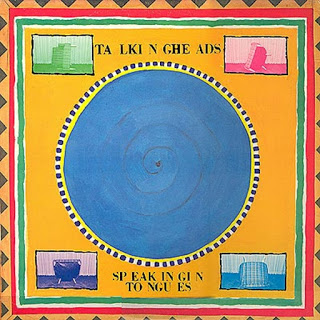
Obviously a step back, no one will ever doubt that, but I will go as far as to say that it’s also a disappointment. I don’t think Speaking in Tongues, the biggest commercial success to date, is as good as everyone says it is.
This album marks the first shift to predominately soul, funk, and worldbeat. Meaning, the first shift away from art punk and, much more importantly, the first shift away from the full-frontal neurotic overthinking and paranoia that makes Talking Heads so special in the first place. But, forgetting all that, let’s take Speaking in Tongues at face value. You’ve got “Burning Down the House”, which is one of the best Talking Heads songs there is, kicking the album off. You’ve got “This Must Be the Place (Naive Melody)”, which is one of the most beautiful Talking Heads songs there is, ending the album proper. The rest is very middle of the road. Perfect songs bookending a lot of mediocrity. A lot of filler, a lot of lukewarm musical ideas. Tracks meander and most are overlong. I think it’s all JUST OK.
Speaking in Tongues also goes back to the early era problem: lacking diversity. This is the swampy funk album, played straight with barely any room for any other style. These are some funky tunes with some care taken to maintain genuine authenticity with some synth lines scattered throughout, but the whole record has this disco dance vibe that isn’t particularly thrilling. Brian Eno is gone and so goes the extra artsiness that he brings to the table, plus the new wave-y glam that he’s good at.
I obviously don’t hate the album. In its defense, the overall atmosphere of darkness rivals Fear of Music and will be the last of sinister Talking Heads you’ll hear going forward. I think displaying the seedy, murky underbelly of jungly dance beats is a solid concept in theory. There’s nothing objectionable from what I consider the mediocre middle. “Making Flippy Floppy” perhaps has the advantage of being right after “Burning Down the House”, but I’ll be goddamned if it doesn’t have one of the record’s better beats with an instrumental bridge reminscent of the seductive, dark energy of Remain in Light’s “Houses in Motion”. “Girlfriend Is Better” is also decent, long-ass coda notwithstanding. Plus you get the famous “Stop making sense” line here!
After that, there’s really nothing to get too excited about until “This Must Be the Place (Naive Melody)”. I don’t really remember the difference between “Slippery People” and “Moon Rocks” or “Swamp” and “Pull Up the Roots”. And why should I? They didn’t really make it easy for me! This album not only feels like the very first step back, but perhaps a deliberate one at that. There’s certainly a momentum here, and it may not be in the direction that fans want it to be, but god knows Byrne is a stubborn one.
Little Creatures (1985) – Rating: 7/10
Click Here for the Full Album Review
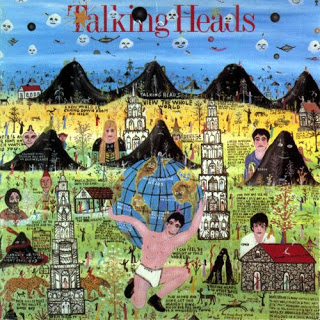
I personally think this is a step up from Speaking in Tongues, which I understand is a blasphemous offense punishable by seven life sentences in the sixth circle of Hell along with the loathsome heretics. I own that. I don’t care.
Little Creatures steps away completely from the swampy worldbeat of the previous album. This is all pop music, baby. Simple melodies that haven’t been heard since the cutesy Talking Heads: 77 days. The production is slicker, almost to a fault as all pop albums were in the mid-‘80s. There are even twangy pop-country songs incorporating a steel guitar! And I don’t hate this! The melodies are so strong and memorable compared to half of the tracks on Speaking in Tongues that the only issue one could have with this record is the band’s alleged selling out. But they didn’t sell out. David Byrne does what David Byrne wants to do, and don’t forget it. And never mind the fact that this is Talking Heads’ highest selling album. Double platinum. Never mind that.
The average radio listener will have heard “And She Was” and “Road to Nowhere” done to death, but these are the highlights. Even if the hooks are simple and catchy, the subject matter reminds you that this is still the same band. “And She Was”, according to Byrne is about a “tripped out hippie chick” (if you couldn’t figure that out anyway). “Road to Nowhere” has a delightfully bouncy accordion melody considering the song is about the futility of existence. The paranoia and anxiety is still there, but it is shrouded completely by straightforward major key arrangements.
The twangy country stuff comes in on “Give Me Back My Name” and “Creatures of Love”; sappy and pretty, bringing the image of the pastoral cover art into music. Standard pop tunes “The Lady Don’t Mind”, “Perfect World” and “Walk It Down” are enjoyable and not at all profound. Special mention goes to the underrated “Television Man”, which features an extend dance-y bridge and call-and-response “na na na na naaa naa”s that are joyful and triumphant! Like the coming of all ye faithful.
This is the beginning of the end for most people, and while I agree with that sentiment, there’s plenty to enjoy here. Don’t be a snob.
True Stories (1986) – Rating: 5/10
No Full Album Review Yet
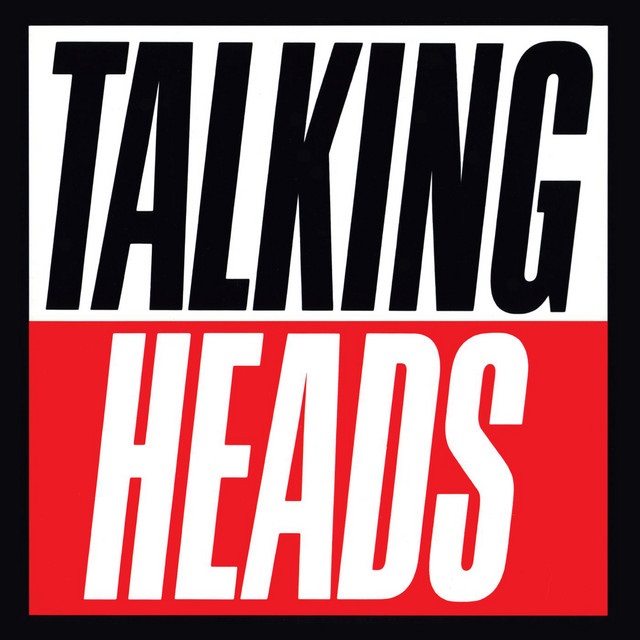
The story of True Stories is as follows: David Byrne wanted to make a satirical comedy musical film about a man in a cowboy hat who visits a town in Texas that is celebrating its 150th year of independence. He meets people around the town and hears their stores from, among others, a man who never speaks to his wife, a woman who never leaves her bed, a woman who always lies, a man with synesthesia, and a preacher of conspiracy theories. If this movie sounds uninteresting to you, then join the club. I’m never going to see this turd.
Most of the movie’s music was written by Talking Heads, and here’s where we have True Stories the album: a collection of studio recordings of all the soundtrack’s music that was actually performed by the band. The funny thing is, it doesn’t feel like a soundtrack album at all, but maybe because it’s a soundtrack album of songs recorded for a shitty movie, everything here is so straightforward and tame that they could have been written by anyone. Earnest pop music that continues the path set forth by Little Creatures, but watered down to nearly nothing, with the stink of 1986 — the worst year for classic rock — all over it.
Nothing here is irredeemable; a couple of songs are fun as hell. “Love for Sale” is a funky, albeit woodenly so, collection of clichés for the purpose of using in commercials (selling love, of course). “Wild Wild Life” always reminds of of the great outdoors during wintertime, probably because of a cover version used in Cool Runnings, but hey! The lyrics do mention a mountaintop, after all! And “Puzzlin’ Evidence” gets very funky in a blocky, ’80s way. You’ll tap your toes even while thinking that the songs aren’t particularly difficult or substantive.
But the rest of the album kind of sucks. “Papa Legba” would be more interesting if it did literally anything else for six minutes. “Radio Head” has cheery accordion perfect for a hootenanny, but coming from Talking Heads it feels empty and sarcastic. Not to mention “Dream Operator”, which is so pleasant and serious that you wonder if there’s a joke you’re missing out on. Everything is just fine, not exciting. Inoffensive and safe. And kind of boring.
Not their finest hour. The rest of band is really starting to get tired of David Byrne in the worst way, and it’s clear that his lofty projects aren’t sparking the same energy in his bandmates as they used to. But don’t worry. After all, it’s just a soundtrack, right?
Naked (1988) – Rating: 7/10
No Full Album Review Yet
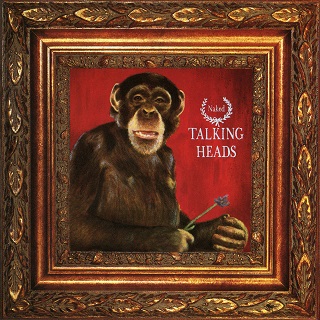
We’ve reached the end. Talking Heads as we used to know them will never make a reunion album as long as anyone lives. To this day, there is just too much contention among the band — namely, it’s Frantz and Weymouth vs. Byrne, and it’s mostly one-sided. Nevertheless, this could have been the band’s “Abbey Road”, but instead it’s just the fizzling out of a career that was on its way out anyway.
Not a bad album, though. It’s just unlike the band’s true roots. David Byrne isn’t nervous anymore. In fact, he’s pretty damn confident, and this confidence brings confident melodies, pompous harmonies, and larger-than-life production. The production is so crisp and upfront that it certainly doesn’t feel like an album from the same year that brought us the moody Sonic Youth’s Daydream Nation, the Gen-X punk revival of Pixies’ Surfer Rosa, and definitely not the muddy, swampy Nick Cave’s Tender Prey. It sounds like something that came out in the last 10 years, and that’s just one of the attributes that it has going for it.
So why am rating this album higher than both More Songs About Buildings and Food and Speaking in Tongues? Three reasons: 1) Finally, we have intra-album diversity. 2) Melodies are stronger and more fun. 3) “(Nothing But) Flowers” kicks more ass than anything on either of those two albums. There, I said it.
In general, almost all of these songs are at the very least interesting. “Blind” leads on in with powerful, ass-shaking brass. “Ruby Dear” dives us into the bug-ridden muck with the something sinister that will remind you of the old days. “The Democratic Circus” is completely Byrnian political commentary with uneasy, watery guitar picking and slow-burn phrases culminating into menacing crescendos. “Mommy Daddy You and I” follows a family immigrating by bus on a cold, bumpy road driven by minor-key ska accordion. This song is a guilty pleasure, and paints the biggest picture after the genius “(Nothing But) Flowers”. The album closes with “Cool Water”, building slowly and thoughtfully on a calm, “speaking” singing style. A fitting end for a long, legendary career.
Stylistically, it doesn’t feel like Talking Heads. But so what? The songs are mostly good, and the album is entirely underrated. Give me this over Speaking in Tongues any day of the week.

